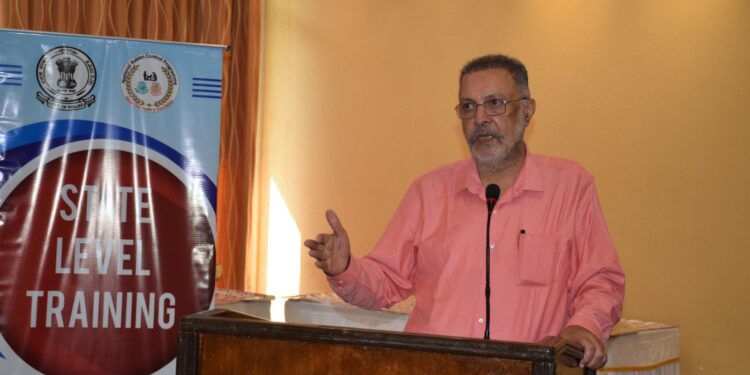CM BHAGWANT SINGH MANN LED PUNJAB GOVT COMMITTED TO PROVIDING WORLD-CLASS HEALTHCARE FACILITIES TO PEOPLE OF STATE
CHANDIGARH, September 28 (Press Ki Taquat)
On the occasion of World Rabies Day, Punjab Health and Family Welfare Minister Dr Balbir Singh on Thursday stressed on the need for multi-sectoral coordination between different departments to minimise the risk of rabies.
The Health Minister was presiding over a training workshop organised to mark World Rabies Day, which aims to raise awareness regarding rabies prevention and highlight the progress being made in the fight against this terrible disease. This year’s theme was “All for 1, One Health for All”, highlighting that one health is not for a selected few, but for everyone, even for the last man standing in the queue.
Addressing the inaugural session, Dr Balbir Singh said that collaboration of different departments including Local Bodies, Rural Development and Animal Husbandry and engaging communities is the only way to considerably reduce the number of rabies deaths. “The only way to prevent dog bites is sterilisation of stray dogs,” he said.
He said that at present, Punjab has 214 functional Anti Rabies Clinics situated at District Hospitals, Sub-Divisional Hospitals, Community Health Centres, a few Medical Colleges and some PHCs. Every district has designated Nodal officers for the National Rabies Control Programme (NRCP) programme, he said.
Notably, a total of 834 paramedical staff and doctors have been given training and Anti Rabies Serum (ARS) is available in the State under Essential Drug List (EDL) and it is available free of cost.
Dr Balbir Singh said that in Chief Minister Bhagwant Singh Mann-led Punjab Government is committed to providing world-class health facilities at zero cost to the public.
He also released a comic book prepared by the Mass Education and Media wing of the department, which aims to spread awareness among children regarding rabies in a pictorial way.
Secretary Health cum MD NHM Dr Abhinav Trikha emphasised that the preventive and promotive aspect of the health sector and in sync with the age-old saying ‘Prevention is better than cure ‘, in the disease of Rabies prevention is the only cure available.
Director Health and Family Welfare Dr Adarshpal Kaur exhorted the training participants to enlighten the field staff of the department regarding the disease and urged the general public to administer rabies vaccination after an animal bite.
Box: What is Rabies?
The fatal zoonotic disease is transmitted through the bite of infected animals carrying the rabies virus, posing a significant public health risk. It is commonly believed that rabies can only be spread from a dog bite. However, contrary to this, the disease can result from bites by various animals, including cats, monkeys, ferrets, goats, bats, beavers, foxes, and raccoons, not limited to dogs. The virus resides in the saliva of infected animals, gaining entry into humans through bites or open wounds.
Signs and Symptoms of Rabies:
The initial symptoms of rabies may include fever, headache, nausea, vomiting, and general weakness. As the virus progresses, other symptoms may develop such as confusion, agitation, hallucinations, seizures, difficulty swallowing, excessive salivation, paralysis, and eventually death.
Steps To Protect Yourself From Rabies:
– Avoid contact with wild animals (or any animal that appears sick or injured)
– Have your pets vaccinated regularly against rabies
– Do not feed or touch stray animals
– Wash animal bites immediately with soap and running water for at least 10 minutes.
– If you are bitten by an animal or suspect that you have been exposed to rabies, seek immediate medical attention and go for immediate rabies vaccination.
– Report all animal bites to your local health department



